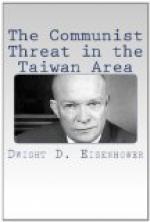6. The joint resolution of Congress, above referred to, includes a finding to the effect that “the secure possession by friendly governments of the western Pacific island chain, of which Formosa is a part, is essential to the vital interests of the United States and all friendly nations in and bordering upon the Pacific Ocean.” It further authorizes the President to employ the Armed Forces of the United States for the protection not only of Formosa but for “the securing and protection of such related positions and territories of that area now in friendly hands and the taking of such other measures as he judges to be required or appropriate in assuring the defense of Formosa.” In view of the situation outlined in the preceding paragraph, the President has not yet made any finding under that resolution that the employment of the Armed Forces of the United States is required or appropriate in insuring the defense of Formosa. The President would not, however, hesitate to make such a finding if he judged that the circumstances made this necessary to accomplish the purposes of the joint resolution. In this connection, we have recognized that the securing and protecting of Quemoy and Matsu have increasingly become related to the defense of Taiwan (Formosa). This is indeed also recognized by the Chinese Communists. Military dispositions have been made by the United States so that a Presidential determination, if made, would be followed by action both timely and effective.
7. The President and I earnestly hope that the Chinese Communist regime will not again, as in the case of Korea, defy the basic principle upon which world order depends, namely, that armed force should not be used to achieve territorial ambitions. Any such naked use of force would pose an issue far transcending the offshore islands and even the security of Taiwan (Formosa). It would forecast a widespread use of force in the Far East which would endanger vital free-world positions, and the security of the United States. Acquiescence therein would threaten peace everywhere. We believe that the civilized world community will never condone overt military conquest as a legitimate instrument of policy.
8. The United States has not, however, abandoned hope that Peiping will stop short of defying the will of mankind for peace. This would not require it to abandon its claims, however ill-founded we may deem them to be. I recall that in the extended negotiations which the representatives of the United States and Chinese Communist regime conducted at Geneva between 1955 and 1958, a sustained effort was made by the United States to secure, with particular reference to the Taiwan area, a declaration of mutual and reciprocal renunciation of force, except in self-defense, which, however, would be without prejudice to the pursuit of policies by peaceful means. The Chinese Communists rejected any such declaration. We believe, however, that such a course of conduct constitutes the only civilized and acceptable procedure. The United States intends to follow that course, so far as it is concerned, unless and until the Chinese Communists, by their acts, leave us no choice but to react in defense of the principles to which all peace-loving governments are dedicated.




